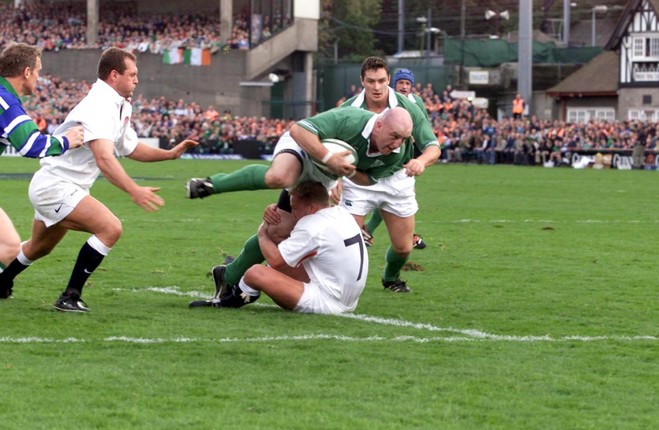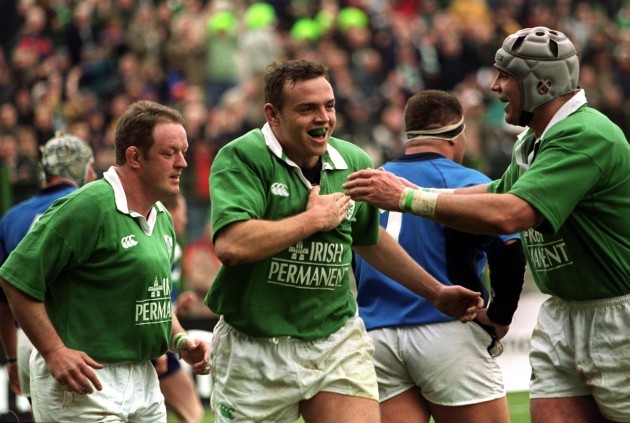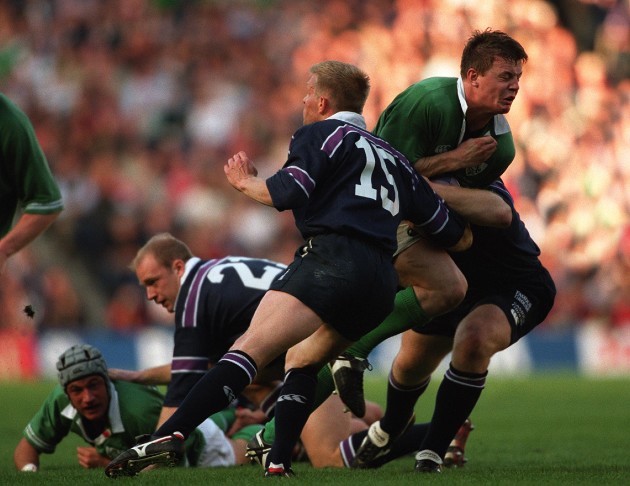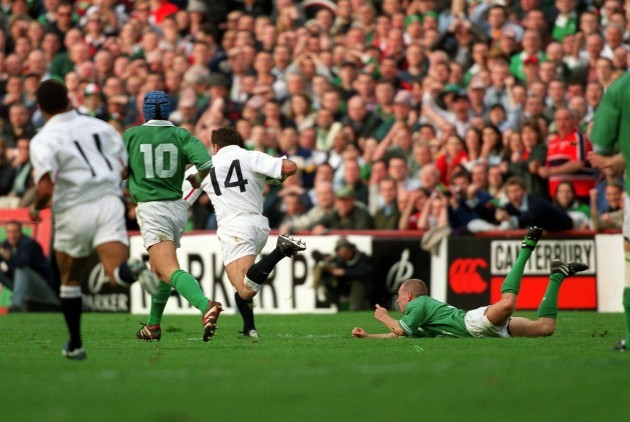LAST UPDATE | 25 Feb 2020
WAY BACK THEN there was fear, just like we have now. The difference was that 19 years ago, it was livelihoods and livestock that were being lost, not people’s lives.
Amid all this, the trivialities of a few games of rugby getting postponed just didn’t matter. For the Coronavirus now, read the foot and mouth crisis of 2001.
Listening to the news over the last 24 hours is a little like watching a repeat of Reeling in the Years. This time we are in the middle of a worldwide health crisis. Back then, the issue was localised and supposedly an agricultural one. Yet it stretched way beyond the farmyard gate.
The country, essentially, was grounded for about a month. Ireland, winners of their opening two games of the 2001 season, were on a roll, prompting giddy talk of a grand slam, even though it was 1948 since the team had last won one.
And deep down no one really believed it would happen. England, after all, had still to come to town. England, after all, had scored 124 points in their first two games. Ireland hadn’t beaten them in seven years.
The wait would stretch to seven-and-a-half.
Like now, the Irish government specialised in supplying information on a drip-drip-drip basis. Foot and mouth had broken out in England, yet because of the importance of agriculture to the nation’s economy, the ruling Fianna Fail administration reacted with extreme caution, instructing sporting fixtures across various codes to shut down.
Across the water, where the crisis originated, further measures were taken, the UK general election postponed by a month. And if you still need evidence that this was a big deal at the time, then read and then re-read the following sentence closely. The Cheltenham Festival didn’t take place that year.
Yup, it was that serious.
So in this context, delaying a few rugby games from spring to autumn wasn’t a national scandal. But just like now, uncertainty prevailed back then too. The round three Welsh game was on; then it wasn’t.
But as soon as the Wales game was confirmed off, the players went on the lash. England was to be the next one. So back they went into camp, going through the motions, staying in the Glenview Hotel, training at Greystones rugby club.
Again, there were doubts. Would it be on or off? As soon as the two Eddies – IRFU admin guys, Eddie Wigglesworth and Eddie Colman – were seen walking towards Warren Gatland, the players knew the answer. England wasn’t on the immediate agenda, beer was.
So to round five, week four of this foot and mouth crisis. Scotland were to be the opponents this time. Again the Eddies arrived to tell them the game was off.
It was rescheduled for September, switched from a round five fixture to the third game in Ireland’s itinerary. Alan Quinlan had been thriving the season before; having played superbly in Ireland’s opening two wins, his first Six Nations starts.
Now it was August, Gatland giving this big speech about how the little things mattered to him, how he wanted to see players help out the kit men and the medical guys by loading stuff on and off the team bus. “Quinny,” Frankie Sheahan said to him. “We’ve jobs to do.”
All that week, they did them. Noisily. “Give us a hand there Frankie, will you.”
“Course I will Quinny. That’s what we’re here for.”
Gatland dropped both players.
They weren’t the only casualties. Peter Stringer got dumped for Murrayfield, so too Mick Galwey. Scotland won, the only time they beat Ireland that decade, Irish paranoia fuelled by the suspicion they were spied on at their Watsonians training base.
The easy line to take now is that this was the defeat that cost Ireland a grand slam, given what happened next, an easy win over Wales, a memorable victory against England.
The truth, though, is uncomfortable. Had the foot and mouth crisis not broken out, had the game been scheduled for March, as originally planned, then England wouldn’t have been deprived of the services of Martin Johnson and Lawrence Dallaglio. “They were never the same team without those players,” Keith Wood said afterwards.
It was what Wood said beforehand, though, that changed the course of that game in Ireland’s favour.
Friday was moving day, when the team shifted from the Glenview Hotel to head uptown to the Berkeley Court, right beside Lansdowne Road.
Bringing his bags down to reception, Eddie O’Sullivan bumped into Wood coming out of lunch and noted his captain’s unusually glum demeanour. “Training was poor today,” Wood said to O’Sullivan, his anxiety fuelled by the knowledge he had never beaten England in his career and that time was running out on him.
So the captain called a meeting with Gatland, O’Sullivan – the then assistant – and David Humphreys, the out-half who had replaced O’Gara after the Murrayfield disaster. All four met in Gatland’s room the night before the game and concocted the simplest of game-plans. Humphreys was to do two things whenever he got the ball: kick to the corners or else to the self-indulgent English full-back, Iain Balshaw. “You don’t pass it, okay,” he was told.
The Ulsterman listened. Wood would score off a pre-rehearsed move, a Gatland special. O’Sullivan’s hunch about Balshaw was correct, too. Having scored five tries in his previous three games, he believed his own hype and went chasing try number six. Each time, Ireland were ready for him.
Still there was luck – a tap tackle from Peter Stringer on Dan Luger preventing a certain try. Four years later, when TG4 re-ran the match on their rugby gold series, a player from that team texted O’Sullivan. “We’re going to get f***ing hammered here. I’m watching this through the cracks of my fingers.”
Somehow they held on. England, World Cup winners two years later, scorers of a record 229 points and 29 tries in that campaign, were held to 14 points, six shy of Ireland’s tally. Gatland, cock-a-hoop, talked loudly about a new contract, foot in mouth coming the same year as foot and mouth. By November he was sacked.




